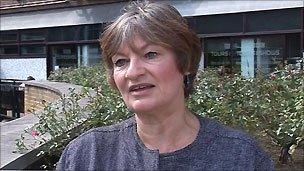First wave of 32 new-style academies open this week
- Published
David Hampson of Grimsby's Tollbar Academy takes Tom Symonds on a tour of his schools
There will be 32 schools opening this term as new-style academies in England.
The number was labelled a "failure" by teachers' unions - while the Education Secretary Michael Gove said he was "quite encouraged".
These were outstanding schools which have taken up the government's offer to opt out of local authority control and become independent academies.
Among the 32 schools, seven are primary schools, the first academies for this age group.
There are a further 110 schools which will convert to academies later - including about 40 primary schools.
This group of schools aiming for academy status also includes a number of grammar schools.
Lack of numbers
Academies are state-funded independent schools which will receive direct funding, outside of the control or support of local authorities.
Mr Gove said the greater independence would help schools to raise standards.
"This will give heads more power to tackle disruptive children, to protect and reward teachers better, and to give children the specialist teaching they need," he said.
Shadow Education Secretary Ed Balls said the "tiny fraction" of schools becoming academies represented a "further embarrassment for Michael Gove".
David Hampson, principal of Tollbar Business and Enterprise College in Grimbsy, which is expecting to become an academy later this year, said schools would profit from the greater autonomy.
"The benefits of becoming an academy will be enormous - less bureaucracy certainly but also more resources which we ourselves will be able to manage," he said.
But Christine Blower, head of the National Union of Teachers, rejected claims that they would raise standards - and said the low take-up showed the idea had failed to catch the imagination of schools.
There are more than 20,000 state schools in England.
"For a policy that was supposed to be a flagship change for education, it is something of a failure to have so few schools opening at this stage," she said.
First wave
These 142 schools, opening this week or later in the year, will be the first wave of a new type of academy.

Christine Blower says the new-style academies have not "caught the imagination"
Under the previous Labour government academies were focused on improving areas of underachievement - with academies having outside sponsors and high-profile buildings.
There are still so-called "traditional" academies opening under this policy - with 64 opening this term.
But the coalition has changed the direction of the academy programme - inviting the most successful schools to take on this independent status, operating outside the local authority.
Among the biggest regional groupings of proposed new academies are in Kent, Essex, Barnet and Lincolnshire. There are also a significant number of grammar schools among the new-style academies.
The principle of schools opting out to take academy status has been strongly criticised by Chris Keates, leader of the NASUWT teachers' union.
"The idea that a handful of governors or an individual head teacher can make such a serious and irreversible decision without having consulted fully with staff, parents and the local community will shock all right-minded people."
Schools taking academy status will become independent schools, with their assets becoming the responsibility of trusts, which will be run as charitable companies.
- Published29 July 2010